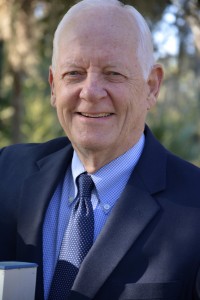In Arthur “Art” Sandeen’s 26 years as head of UF student affairs and 14 years as a College of Education professor, his love and advocacy of students gave the university community a friend and leader they knew they could count on.
These traits help explain why the National Association of Student Personnel Administrators (NASPA) has chosen Sandeen to receive its 2014 John Blackburn Distinguished Pillar Award for his service to students and university communities.
 The award recognizes a past “Pillar of the Profession,” a title awarded by NASPA, who has continued to grow and strengthen the student affairs field. Sandeen was named a Pillar of the Profession in 1999. He will receive the Blackburn award at NASPA’s annual conference in March.
The award recognizes a past “Pillar of the Profession,” a title awarded by NASPA, who has continued to grow and strengthen the student affairs field. Sandeen was named a Pillar of the Profession in 1999. He will receive the Blackburn award at NASPA’s annual conference in March.
Sandeen has been a professor of higher education administration at the College of Education since 1999. Prior to teaching at UF, Sandeen was an administrator of residential services at Michigan State University in the 1960s. Then, he was a professor and the dean of students at Iowa State University. In 1973, Sandeen joined the Gator Nation as the vice president for student affairs.
UF’s Division of Student Affairs now honors Sandeen’s legacy through the Art Sandeen Outstanding New Professional Award, which is given annually to a student affairs staff member that exemplifies the values that Sandeen modeled: “dedication to the profession, a love for students, commitment to mentoring others in the profession, and a commitment to academic excellence.” UF’s student government also recognizes one faculty member each year with the C. Arthur Sandeen “Improving the Quality of Life” Award.
Between 1999 and 2004, Sandeen served as coordinator of the graduate program in student personnel in higher education at the College of Education. But since 2004, Sandeen has “retired” three times, but something continues to draw him back to university life. He has been teaching part-time and serving on doctoral advisory committees since he first retired.
“I have loved working with students at Michigan State, Iowa State and UF,” Sandeen said. “I strive for strong connections with my students because I think that is what you’re supposed to do if you care about students and about what they’re doing, and if you are trying to be of assistance to them in any way.”
When wearing his professor hat, Sandeen teaches his students that establishing trusting relationships with students is one of the most important aspects of working in student affairs. He also advises his students to “be willing to change with the times.”
Sandeen is exploring the latter quality in a new book he is writing with Margaret Barr, the former head of student affairs at Northwestern University. The book, which is the second to be published by the duo and Sandeen’s eighth overall, will focus on ways that student affairs administrators can best cater to today’s generation of college students. According to Sandeen, one of the biggest issues lies in how university student affairs will adjust to the increase in residential and face-to-face campuses moving online.
Sandeen is also the author of three monographs, more than 50 published articles, and 21 book chapters. He received his bachelor’s degree in religion and psychology from Miami University in Ohio, and his master’s in college student personnel administration and a doctorate in administration and higher education from Michigan State University.
He says he became intrigued by student affairs as a college student at Miami University in the late 1950s. At the time, Sandeen was very involved in campus life through his leadership positions in student government, Greek life and other organizations. He also worked in the dean of students office, where he met the vice president of student affairs.
“I didn’t know anything about this field except what I learned from my involvement on campus,” Sandeen said. “But when the vice president of student affairs encouraged me to consider student affairs, I did, simple as that. I have loved it and have been very lucky.”
The field of student affairs also opened up opportunities for Sandeen that met his interests in civil rights and social justice. After Martin Luther King, Jr. visited Miami University in the late 1950s, Sandeen realized that getting involved in student life meant getting involved with social issues.
“I was a philosophy major, I loved ideas, and I was raised in a family in which we had a great concern for people and for rights,” he said. “During the Civil Rights Movement, I hated the injustice and I saw student affairs as a way to get involved in such social efforts.”
Sandeen thinks that college students’ participation in campus activities is directly related to the quality of education they receive. According to Sandeen, “people learn in a variety of settings and different ways,” like dance groups, cultural organizations, honor societies and student media. At UF, students can choose from nearly 1,000 student organizations.
“Students I’ve known over the years who get involved in something can learn more about themselves and different backgrounds and cultures, as well as how to get along with other people,” Sandeen said. “There’s a good deal of evidence that the students who really learn how to do those things aside from getting a degree are more likely to be successful in their lives.”
CONTACTS
Source: Art Sandeen, sandeen@ufl.edu
Writer: Alexa Lopez, UFCOE News & Communications
Media Relations: Larry Lansford, Director, News & Communications, llansford@coe.ufl.edu; 352-273-4137